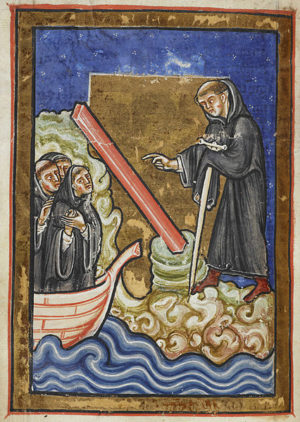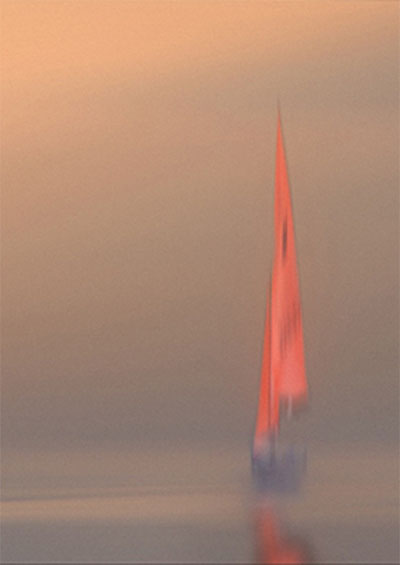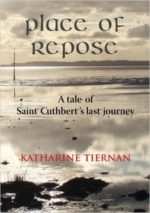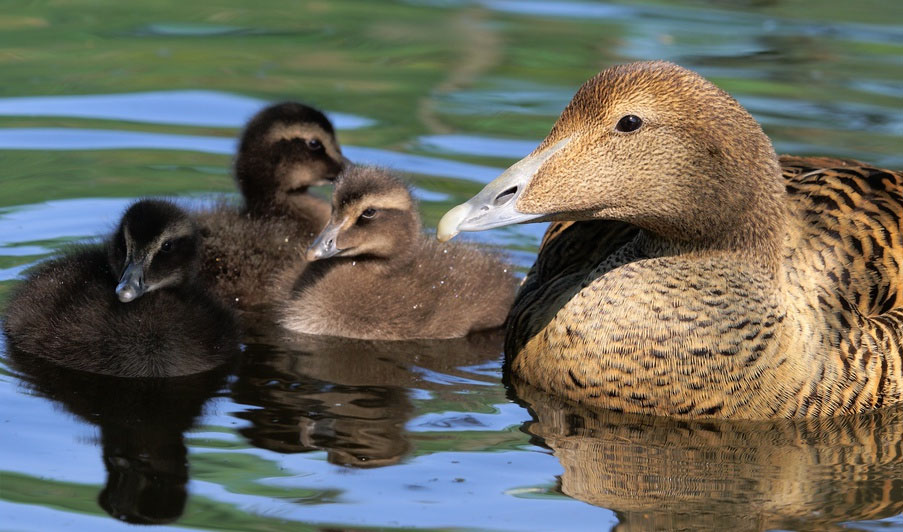THE RED SAIL
A short story by Katharine Tiernan about St. Cuthbert’s years in retreat

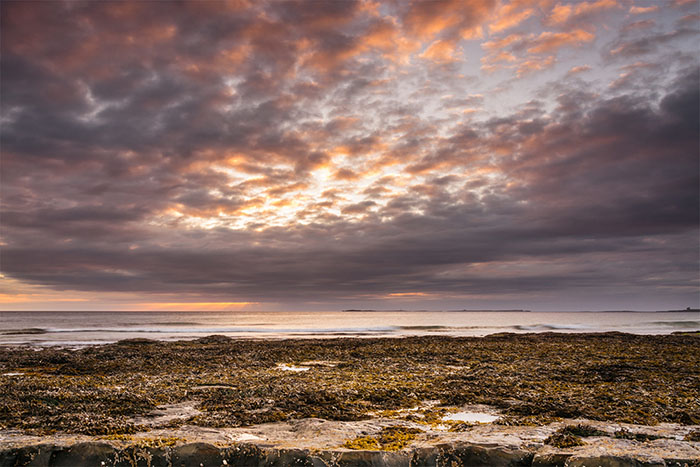
The Red Sail
A short story by Katharine Tiernan about St Cuthbert’s years in retreat
“To learn the first steps of the hermit’s life he retired to a more secluded place in the outer precincts of the monastery. Not till he had gained victory over our invisible enemy by solitary prayer and fasting did he take it on himself to seek out a more remote battlefield farther away from his fellow men. The Farne is an island far out to sea, cut off on the landward side by very deep water and facing, on the other side, out towards the limitless ocean. The island was haunted by devils; Cuthbert was the first man brave enough to live there alone.”
Bede: ‘Life of Cuthbert’, Chapter 17
Inner Farne 676
A long spit of rock opposite the seaward end of the Island stills the swell of the ocean, and the current carries the boat through into calm water. The men rest the oars for a moment, staring through the water at the green seaweed swaying below. The April sunshine is warm on their arms. ‘Here?’ they ask him, and he nods.
They beach the boat on a small stretch of sand between the rocks and start pulling out tools and provisions, piling them up above the tideline. Then they take out bread and ale, but he will not eat yet. He leaves them on the beach and climbs up through the marram grass onto the land. He looks about him. Grass covers the thin topsoil, the land level for a hide or two before it slopes away steeply towards the cliffs at the far end. The new grass is not through yet, but last year’s dead seed heads sway and rustle in the breeze. Two ragged hawthorns in a hollow are breaking into bloom. Waves hiss on the rocks. The distant snatches of voices from the beach below scarcely breach the stillness. The wind blows, and all about him the sea stretches away to the mauve edge of the horizon. The strangeness of it empties his soul. He is the first man to stand here.
The hermit
Only fresh water is lacking when he first arrives. He collects rainwater for his needs, but the cistern often dries out. So when his brothers visit he asks their help to hew out a pit through the rock, praying that – as water had sprung from rock at Moses’ command – so might it here. In the morning he and his brothers find the pit full of water springing up from beneath the rock, a spring that never fails.
As soon as his hut is built, and a small oratory, he starts to dig the land over. He does not want to be beholden to the brothers for his food. Although he is past middle age, he is still a strong man and he does not spare himself. He works steadily, turning over the soil into regular trenches and piling the turf near the shore, where he plans to build a guest house. The ravens who live on the Island watch him, heads sunk back into their chests and feathers ruffled out against the wind, patient. As soon as the barley goes into the ground they are on it, long beaks digging the grain from the soil. He calls out to them at once, remonstrating.
‘Why are you eating my grain? Do you need it more than I do? Has God given you permission to take it?’
The ravens pause. The Saint’s voice makes them uneasy. The pecking ceases; after a while they hop away sideways with a show of disinterest. He knows they have heard him. Next morning they return in remorse with a lump of fat for him, spreading out their wings on the ground in contrition. After that he sows barley and his crop grows unmolested.
As spring turns into summer the Island is almost constantly light. When he lies down on his pallet for the first sleep of the night, he can still see the outline of the hut around him and darts of light piercing the cracks where the mud has shrunk from the wood. A few hours later it is already dawn when he rises for Lauds. The pale grey light turns rosy as the red sun slides up from beneath the sea and the waves glitter and dazzle. But he restrains his eyes and goes into his oratory. Although the Creation speaks the praise of God, it is only a shadow of His eternal kingdom. The casement is placed high up in the wall of the oratory so that his senses are not ravished by the beauty that surrounds him. Nevertheless, when he is outside working in his vegetable patch, pulling the groundsel from between the onions, he does pause; does linger for a moment listening to the screeching of the terns and the rush of surf through the long fissure in the rock below his hut.
The winter months are his penitential, when demons flock back to the Island and catch him unawares as he goes about his business. As he struggles to the spring through a shrieking easterly they catch at him and rip his tunic, or trip him and send him sprawling on the soaking rock. He sees them riding the pelting snow storms, their yellow eyes aflame with malice; they chitter and squeak at his door through the long lightless hours of psalms and vigil. The cold tightens all his bones and tendons till he can scarcely move; the blood stands still in his veins and the air freezes at his nostrils. He does not falter. Indeed, his heart is alight with joy in the midst of his suffering, and he feels Christ’s presence more constantly.
He will not have women on the Island. He wants his celibacy to be complete. No distraction. Nevertheless when spring comes, an eider duck makes her nest in the shelter of his hut, snugly formed against the rough daub and wattle. The outer part is shaped with dry grass and seaweed. She plucks the down from her own breast to make the soft lining; the softness, the tenderness of it touches his heart. Then she lays her eggs, day by day, large pale green eggs nestled in the down. She pays no attention to his comings and goings, but visitors disturb her and she runs off the nest at their approach. When his brother Edward stoops down to pick up the eggs, Cuthbert reproves him; put them back, he says. Edward stares at him and returns them to the nest.
When the clutch is complete, she sits on them, her mottled brown and white feathers like the earth beside her; only the brightness of her dark eyes gives away her presence. When he prays in his cell he knows she is there, a few feet away, holding her vigil. Hour after hour, motionless, they are together.
On a day of blustery winds the ducklings hatch out, tiny dark balls of feather that scuttle wildly to and fro till she shoves them under her wings with her broad bill. When all the cracking and breaking of the eggs dies down, she runs her beak around the nest to make sure that the hatch is complete. Then she sets off on her sturdy webbed feet, down the slope towards the bay with a trail of ducklings behind her, blown and buffeted off course by the wind, dashing back behind their mother’s upturned tail and sheltering breast. They skitter across the sand till the waves catch them and in a moment they are bobbing up and down on the heaving sea, tiny fragile slips of life.
Each day he watches them coming up out of the water onto the sloping yellow-lichened rock by the bay, not alone now but in a nursery of other ducks and young. When a black-backed gull swoops down for a duckling, the mothers herd them close and fight together. The ducks take care of it. The drakes, resplendent in their black and white plumage and long striped beaks, keep to themselves, riding the waves offshore.
The first year in his kingdom there are other predators too. The fishermen used to avoid the islands for fear of the devils that inhabited them. Now, emboldened by his presence, they come ashore looking for eggs. The ducks huddle close in to their young instead of flying away; it is easy for the men to grab them and twist their necks as the ducklings scatter frantically in all directions. When they are gone he tries in vain to gather them. Giving up at last, he sits on the shore and weeps at the mindless evil of mankind.
After that Cuthbert has the brothers bring him parchment. His presence has brought about this slaughter, and he must prevent it. He writes a decree that neither eider ducks nor their eggs may be taken from the islands. The other seabirds – the kittiwakes, guillemots, razorbills – nest high on inaccessible cliffs, too high for marauding hands. The puffins are safe in their burrows. But the ducks are defenceless.
When he sees the decree, the king laughs, but he makes it law for Cuthbert’s sake. Cuddy’s ducks, the fishermen call them.
The bishop
As his solitude stretches out across the years, his soul is scoured clean of desire. The endless ocean is his desert, the stars and wind his Azrael. He is the intercessor for his people at the very door of Heaven. But still they want more of him. One autumn day he looks up from the rock where he grinds barley for his bread. He sees a ship launch from the distant shore of Bamburgh. It is not the small craft the folk use, but the king’s longship with a red sail and half a dozen rowers at the oars. The sail takes the wind and the ship leaps forward so swiftly that he can soon make out the figures standing amidships.
It is not a surprise. He has been turning away letters and messengers for weeks now, praying that the time would not be yet. But long ago when the sight was on him he saw the ship with a red sail and knew it held his destiny, as Abbot Boisil had foretold a score of years ago. He knows he can escape it no longer. He will have to leave the Island: lay aside his woollen habit for cope and mitre; forsake his solitary vigils to wait upon kings and thegns and all the cares of the bishopric. The ship hastens closer, spray flying from the bows as it cuts through the waves that have enclosed him. His spirit fails. He has stood so long upon the threshold of the other world; how can he draw back?
Please follow and like us:
“Shortly afterwards there was a great synod in the presence of King Ecgfrith at which Cuthbert, by general consent, was elected Bishop of Lindisfarne. Letters and messengers were sent to him repeatedly, but he refused to move. The King himself, and that most holy bishop Trumwine, with numerous devout and influential personages sailed across, knelt down and adjured him by the Lord, and wept and pleaded with him, until at last he came forth, very tearful, from his beloved hiding-place and was taken to the synod. Very reluctantly he was overcome by their unanimous decision and compelled to submit to the yoke of the episcopacy.”
Bede: ‘Life of Cuthbert’, Chapter 24
Main image: Sunrise over the Farne Islands. Photo: drhfoto, Fotolia
Katharine Tiernan discusses her interest in St Cuthbert, and the study tour in his footsteps she will lead this September.
St Cuthbert and Bird Conservation
St Cuthbert is regarded as having introduced the earliest bird conservation laws in the world. Dated around 675CE, his decrees protecting the eider ducks predate the Sea Birds Preservation Act of 1869 and the Wild Birds Protection Act of 1880 in the UK by twelve centuries. Cuthbert’s special relationship with the eider duck, now Northumberland’s emblem bird, is commemorated in the local name for them, Cuddy’s ducks, ‘Cuddy’ being the familiar form of Cuthbert.
MORE IN BESHARA MAGAZINE:
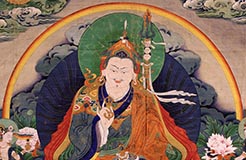
Unlocking the Heritage of Tibet
Dylan Esler talks about the ancient contemplative tradition of Dzogchen Buddhism – the ‘effortless path’ – and the 84000 Project, which is preserving the precious heritage of Tibetan Buddhism
‘Once we learn to dissolve that sense of having to react to whatever occurs, then we open up to a more spacious perspective, and that is the perspective of non-duality.’
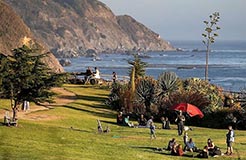
The Vision of Esalen
Michael Murphy, co-founder of the Esalen Institute in California, reflects on the contribution of an institution that has revolutionised our understanding of spirituality
‘We’re all, whether we know it or not, together involved in a cosmic jailbreak, breaking out of our golden chains.’
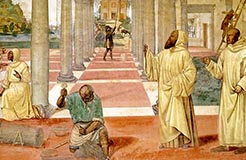
Transmission Across Cultures
Writer and art historian Diana Darke brings to light the largely unacknowledged influence of Islamic architecture and craftsmen on the iconic buildings of Europe
‘If you are building a prestige project, of course you’re going to go for the best, wherever it comes from.’
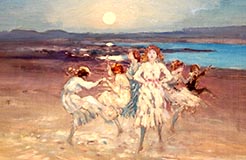
George William Russell: A Forgotten Irish Mystic
Gabriel Rosenstock gives a poetic response to twelve visionary paintings by the ‘myriad-minded’ writer and polymath
‘[Through his works] we may see the world once more in its primal beauty, may recover a sense of the long-forgotten but inextinguishable grandeur of the soul’
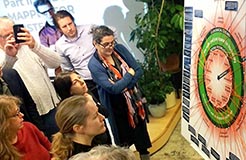
Rolling Out the Doughnut
Leonora Grcheva of DEAL talks about how Kate Raworth’s innovative economic theory is being translated into sustainable practice in cities across the world
‘The Doughnut gives us a new way to conceptualise who we are, how we position ourselves as part of the living world, and how we can reimagine our future’
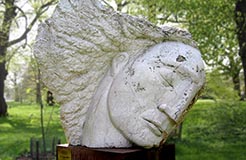
Emily Young: Giving Voice to the Earth
The distinguished sculptor Emily Young talks about her work and the stories that stone can tell us
‘What does it look like when a human is at one with the universe? Embracing it all…’

Richard Lewis: Pilgrim in the Land of Children
Robert Hirshfield appreciates the work of a teacher who has devoted his life to inspiring children to write imaginative poetry
‘A child is the privacy of a universe learning to talk to itself.’

The Power of Gold
Alan Ereira talks about his new book, which traces the relationship between human beings and this most precious metal over a period of 7,000 years
‘The notion that gold contains immutable value is somehow enormously powerful. Of course, gold doesn’t actually have that value in itself; we attribute that to it without thinking, unconsciously.’
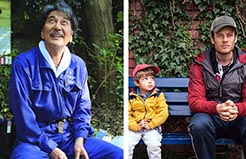
Introducing… ‘Perfect Days’ and ‘Nowhere Special’
Jane Clark watches two films with a contemplative theme

The Philosophy of Prayer
Distinguished theologian George Pattison talks about the meaning of prayer in the modern world and how it brings us to awareness of our essential nothingness
‘Our starting point always has to be that we are not makers of our own being, but we are before we start doing anything for ourselves.’
